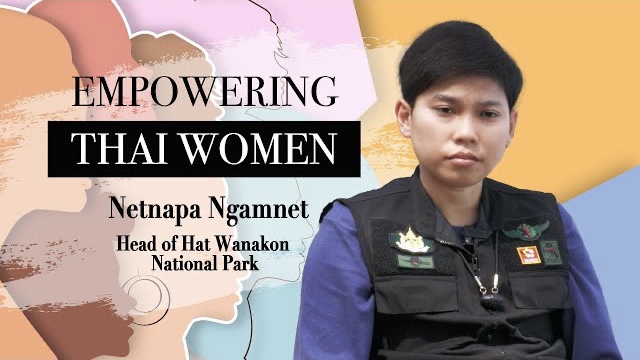Being a young female leader in Thai forestry – Netnapa Ngamnet

Netnapa Ngamnet, who’s currently the head of Hat Wanakon National Park in Thailand’s coastal province of Prachuap Khiri Khan, is one of a very few women in positions of power in forest conservation, especially under the Thai government’s Department of National Parks, Wildlife and Plant Conservation.
Born in the eastern province of Sa Kaeo, Netnapa grew up in a military camp and was surrounded by abundant nature throughout her childhood, which eventually inspired her to pursue her career in forest conservation.
“I would say that it has been my childhood dream,” she said. “My father was in the military, while my mother was in farming. Every weekend, we would grow rice, cassavas, eucalyptus and fruits. So, I felt that my father’s job was secure and it could feed myself and my family.”
Strong female in forestry
After completing her studies at the Faculty of Forestry at Kasetsart University, Netnapa began her career as a government official at the Royal Forest Department. During that time, she joined a special investigative team, named Payak Prai. Its main duty was to investigate and crack down on illegal activities in forest reserves.
Despite being the only female in the team, she was trusted by her team leader at the time, Cheewapap Cheewatham, and then-Deputy Director General Attapol Charoenchansa.
Netnapa later moved to the Department of National Parks, Wildlife and Plant Conservation and led another investigative team, named Phaya Suea, while also working as an assistant to the Head of Sai Yok National Park in Kanchanaburi. Soon she became an assistant to the head of Kaeng Krachan National Park in Petchaburi.
One of her work highlights was the arrest of the Deputy District Chief in Kanchanaburi and 11 others for animal hunting in 2018. Another was the rescue of Karen villagers in 2021, which also led to the prosecution of 30 people involved in trespassing in forest reserves.
“I was the one who planned the rescue and deployed officials for that mission,” she recalled. “We rescued 87 Karen villagers with three helicopters and evacuated them to Kaeng Krachan National Park.”
After gaining much experience, she was later promoted to Head of Khao Nang Panthurat Forest Park in Cha-am district of Petchaburi, before being appointed as the head of Hat Wanakon National Park.
Being the head of a national park is not an easy job, as it doesn’t only involve oversight of the park and welcoming visitors. As Netnapa explains, her job also involves other responsibilities, such as land and sea patrols, to protect its natural resources and to prevent illicit activities within the park. Therefore, learning how to use weapons, self-defense techniques and even diving are vital, which means Netnapa has to attend all training sessions that are necessary to fulfill her duties.
Being the daughter of a soldier doesn’t mean that Netnapa was good at using weapons at a very young age. Therefore, she had to go through a lot of training to familiarise herself with weapons. Now, Netnapa has become a strategic trainer in using weapons for the department.
“My dad never taught me any of this,” she confessed. “I had to go through a lot of training, including how to use weapons and how to conduct investigations. It is like you’re training a soldier or a police officer. So, the reason I trained is to become familiar, have expertise in it and to provide that knowledge to other park officials, so that they are safe on duty. The use of weapons is not there only to win a fight, but also to ensure safety for all park officials.”

It’s hard to be accepted as a female leader
In Thai forest conservation, it is still rare to see young women in leadership positions, even though there are more female government officials in the industry. Although Netnapa, who is currently 37 years old, has proved to be as strong as male officers, the biggest challenge for her, as a female leader, was to gain acceptance from her subordinates.
“Getting acceptance from other officials or subordinates is the most challenging part,” she said. “If it’s a male leader, people automatically accept you 50%, the rest would depend on your work and how much you can make your subordinates trust you. Being a female leader, people either have zero acceptance, or minus even. So, we have to work twice as hard to be accepted.”
Regardless of what other people think, nothing can discourage her from doing her best.
“Of course I’ve been misjudged by others, but I think we should turn it into motivation. Motivate yourself and prove it to them, and gain all of the skills you need. It has taken at least 6-7 years to learn everything myself from scratch, learning all the strategies. I have had many students who trained with me.”
The best way for Netnapa to earn respect as a leader is to be able to execute her duties first, before giving assignments to her subordinates. In fact, she also believes that being a female leader can be an advantage, as they are good at paying attention to detail.
“Whatever I command my subordinates to do, first of all I must be able to do it, even if I may not do it as well as men, but I must be able to do it. Another strength is that women are very detail oriented and discreet and, because we’re so thorough, we can come up with plan B and plan C, or we might be able to think of the worst cases, which can help us prevent them from happening.”
Keep trying, it will only make you stronger
Despite being in a male-dominated career, Netnapa believes that society is much more open than before. This means that many occupations can be suitable for everyone, regardless of age and gender.
“It only depends on how hard you try,” she said. “Same with forest conservation. Nowadays there are more heads of national parks who are female. So, first of all, I want to encourage everyone not to give up. You might have to try much harder than others, but it’s okay. Your effort will eventually reward you with something, and it will only make you stronger and probably stronger than anyone else.”
By Nad Bunnag, Thai PBS World






